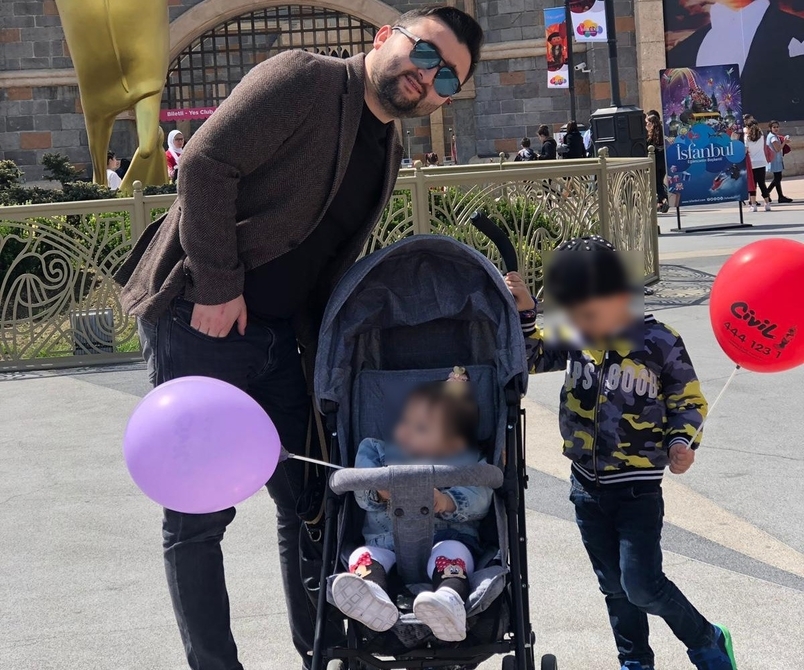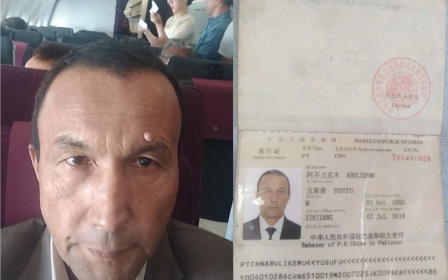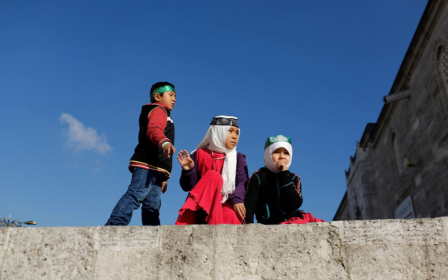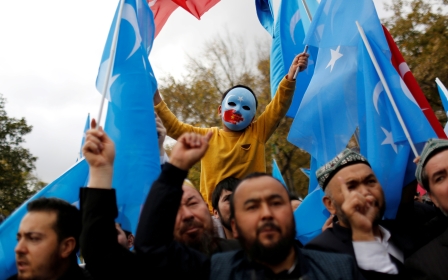Family of Uighur businessman fear he will be deported from Turkey to China

The family of a Uighur businessman who has been in Turkish custody for two months fear that he will be deported to China where he could face imprisonment inside an internment camp housing millions of Muslim Uighurs.
Aihemaiti Xinaimixiding's is only the latest case of a Uighur fearing deportation in Turkey, which has allowed thousands of members of the Muslim minority group to live.
Turkish police detained Aihemaiti Xinaimixiding, a 29-year-old father of two who owns a car accessories factory, on 30 May.
His wife, Ekide, told Middle East Eye that the police did not say why he was taken, but only that he needed to give a statement at a police station. Since then, she said, he's been moved to several deportation centres.
"If he has done a crime, why has he not be taken to prison instead of a deportation centre," she told MEE from her home in Istanbul.
New MEE newsletter: Jerusalem Dispatch
Sign up to get the latest insights and analysis on Israel-Palestine, alongside Turkey Unpacked and other MEE newsletters
Court documents seen by Middle East Eye allege that Xinaimixiding financed a terrorist group called the Uighur National Movement, but he has denied these claims, telling AFP he has never heard of the group.
"My husband has never been involved with such illegal organisations. Everything he has done has been done within the law. He is a family man who loves his children very much," she said.
Xinaimixiding is currently in the Pehlivankoy deportation centre in the northwestern province of Kirklareli. He holds a valid Turkish long-term residence permit and relevant work permits to operate his business, copies of which MEE has seen.
Earlier this month, Uighur representatives met with Turkish Interior Minister Suleyman Soylu to discuss the plight of the Muslim-minority.
Xinaimixiding told AFP that dozens of Uighurs held in the same deportation centre had been released after the meeting, but eight Uighurs, including him, remain in detention.
Ekide said her husband's family in China has been "forced" to sign a repatriation order and she believes it is this order that prompted Turkish authorities to arrest and detain Xinaimixiding.
Ekide said her decision to go public about her husband's deportation case was prompted by rumours that Turkey had deported a Uighur mother and two children to Tajikistan before they were then taken to China.
"I was afraid that the same would happen to my husband," Ekide said.
Turkish authorities could not be reached for immediate comment due to the Eid holidays.
Xinaimixiding's detention comes after MEE first reported in July that Turkish authorities had issued deportation orders for Uighurs living inside Turkey.
After the report, Turkey said it had not deported any Uighurs and wouldn't do so in the future, but also said that members of the Muslim-minority who perpetrate crimes will have their residency permits taken from them.
Commenting on claims that Turkey had deported Zinnetgul Tursun, the woman sent back to Tajikistan with her two children, Turkish authorities said the Tajik embassy in Ankara confirmed her citizenship.
"There were claims [Zinnetgul Tursun] was not Tajik, but [the Tajik embassy] insisted she is their citizen. We will find out what happened. We never deport Uighurs from Turkey to China," Ramazan Secilmis, a senior official at Turkey's immigration agency, told reporters.
Turkey is home to thousands of Uighurs who have sought refuge after facing persecution in the Xinjiang province of China.
It is also one of the few countries who has spoken out against Chinese oppression towards the Turkic minority.
Despite rising concerns over China's treatment of Uighurs, Turkey was not one of 22 countries which called for an investigation into abuses inside the Xinjiang province at the United Human Rights Commission earlier this month.
Middle East Eye delivers independent and unrivalled coverage and analysis of the Middle East, North Africa and beyond. To learn more about republishing this content and the associated fees, please fill out this form. More about MEE can be found here.




